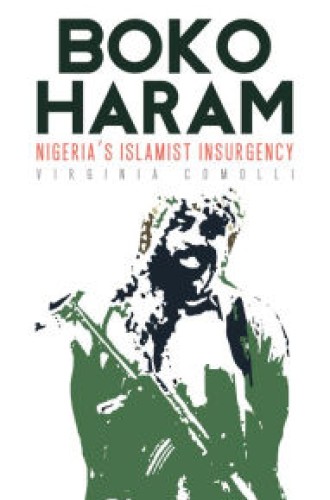Glimpses of Boko Haram
Many Sunni Muslim movements of an Islamist bent have arisen in the Middle East, South Asia, and Africa over the last few decades. Virginia Comolli, a research fellow for the International Institute for Strategic Studies in London, chronicles the rise of the Islamist group in northeastern Nigeria that the local media call Boko Haram.
Boko Haram probably means “book knowledge (or education) forbidden,” although Comolli questions that formulation because it emphasizes only one aspect of the movement’s initial agenda: hostility to the mediocre but basically secular education provided by the Nigerian state in schools it deems anti-Islamic. Boko Haram has gradually developed grander designs than the purely educational over the years since its founding. Western media have focused mainly on its hostility to education for girls and have centered world attention on the kidnapped schoolgirls of Chibok, but there are many other aspects of Boko Haram that cause concern for Nigerians and their neighbors in West Africa.
Read our latest issue or browse back issues.
For more than two decades, Boko Haram has called itself the Community of Sunni People for the Propagation [of Islam] and for Struggle (jihad). Having made some linkage via social media with the self-declared Islamic State in Iraq and Syria (ISIS), the leadership of Boko Haram claims today that it wants to be known as the Islamic State West Africa Branch (ISWAB).
ISIS in Syria and Iraq hopes to abolish those two states, which were created by the victorious powers after World War I, and to carve out from them a purely Sunni Arab Muslim state on the model of the seventh-century caliphate, the government established by the leaders who succeeded Muhammad after his death. The aims of Boko Haram in Nigeria remain less clear. The founder, Muhammed Yusuf, started out 20 years ago as a dissident mosque leader in Maiduguri, the capital of Borno State in Nigeria’s extreme northeast. Critical, like many educated Nigerian Muslims, of official Islam in Nigeria and its blatant hypocrisy, Yusuf eventually focused on Nigerian secular education as the cause of Muslim decay in his country.
In the aftermath of the extrajudicial killing of Yusuf by the police in 2009, more shadowy and frightening leaders have emerged in Boko Haram, especially Abubakar Shekau, a man whose videotaped interviews make him appear highly excitable and possibly crazed. Shekau sometimes even suggests that he wants to transform the whole of Nigeria—not merely the Muslim majority areas—into an Islamic state. Given the fact that 40 percent of Nigeria’s 180 million people are Christian, and another 10 percent are adherents of indigenous belief systems, Boko Haram has its work cut out for it. It has attacked not only Christian churches and secular schools, but also Muslim mosques and mystical confraternity lodges whose practice of Islam it considers insufficiently puritanical. Its stated aims and violent tactics are not gaining much traction with either Muslims or Christians elsewhere in Nigeria.
All of this has complicated the task Comolli has set out for herself in this study. She wants to give an accurate account of Boko Haram, but it is almost impossible to do research close to the center of the action or to interview the main protagonists. The risks would be too great for the researcher, and the Nigerian government does not want scholars from overseas to fall into the hands of Boko Haram agents the way foreign journalists and aid workers have been captured, held for ransom, and eventually executed in the ISIS-controlled parts of Syria and Iraq. The Nigerian government may also not want outside observers to witness human rights violations perpetrated by the Nigerian army and police as they combat the insurgency. So Comolli’s book offers a long-distance sketch of what Boko Haram may be, what its critics think about it, and how the Nigerian government has responded.
The weakest chapter is the second, in which Comolli attempts to sketch the early history of Islam in Nigeria prior to the era when Boko Haram began to form. Comolli demonstrates her unfamiliarity with the scholarly work done in the 1950s and 1960s by Nigeria-based Arabists, at first British but eventually Nigerian as well. These scholars edited and analyzed the extensive historical, religious, and juristic writings in Arabic of the Sokoto jihad (1804–1808), which were composed by highly literate scholar-rulers: Usman dan Fodio (whom Comolli consistently calls Fodio, wrongly construing his father’s profession as a surname), his brother Abdullahi dan Fodio, and Usman’s son and heir, Muhammad Bello.
One cannot emphasize sufficiently the influence exerted on these early 19th-century scholars and coup-makers by the writings of the rigorist thinker ‘Abd al-Karim al-Maghili, a maverick Berber puritan of the late 15th and early 16th centuries, who had been driven out of the Sultanate of Morocco for his extremism. Al-Maghili eventually found patronage for his radical views in royal courts in what are now Nigeria and especially Mali. The leaders of the Sokoto jihad three centuries later did not seem to realize the exceptional intolerance manifest in al-Maghili’s definition of what constitutes apostasy.
Too many of Comolli’s historical assertions are based on the work of fellow security analysts that is available online. She also relies entirely too much on the work of Nigerian and expatriate journalists, as well as on speculation by academics attached to research centers funded by British and American intelligence agencies.
Finally, she is too quick to assert Wahhabi Islamist influence in West Africa, even in the 18th century. In particular, she claims that Jibril ibn ‘Umar, a teacher of Usman dan Fodio at Agadez in today’s Niger, who had made the pilgrimage to Arabia in the 18th century, “echoed Wahhabi rhetoric” in his juristic writing. It is not likely that Jibril could have been both a Wahhabi and at the same time a propagandist for the Qadiri mystical confraternity, to which both he and Usman dan Fodio enthusiastically adhered, given the anti-Sufi bias of all Wahhabis. Not every extremist is a Wahhabi.
In the other chapters Comolli does a better job of detailing the multiple fractures in northern Nigerian Islamist groups in the 1970s and afterward, as well as the internal wrangling in the leadership of Boko Haram. There are factors in the rise of Boko Haram that remain obscure, and Comolli realizes this better than some Nigerian and expatriate military advisers of the government. Despite the criticisms voiced here, Comolli’s book will be very useful for introducing outsiders to the complexities of Islam in northeastern Nigeria in modern times.






